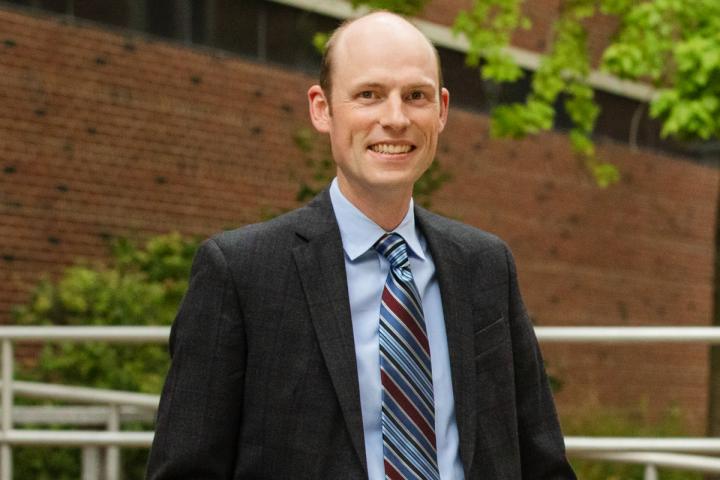University of Illinois Urbana-Champaign Professor of Molecular and Integrative Physiology Erik Nelson has won a $4.5M Era of Hope Scholar Award from the United States Department of Defense (DoD) Breast Cancer Research Program (BCRP).

Credit: L. Brian Stauffer
University of Illinois Urbana-Champaign Professor of Molecular and Integrative Physiology Erik Nelson has won a $4.5M Era of Hope Scholar Award from the United States Department of Defense (DoD) Breast Cancer Research Program (BCRP). This prestigious award supports individuals early in their careers who have demonstrated significant potential to effect meaningful change in breast cancer research. Recipients of the Era of Hope Scholar Award are leaders and visionaries in their respective field who go beyond conventional thinking to change the current landscape of breast cancer research and therapy.
Approximately 1 in 8 women will be diagnosed with invasive breast cancer in their lifetime as it continues to be the second leading cause of cancer-related deaths in women in the United States. The DoD, in collaboration with several experts, has identified several areas of current shortcomings in the areas of breast cancer management, diagnosis, and therapy. Nelson will spearhead a collaborative and interdisciplinary research team to address several of these key areas.
“The American Institute for Cancer Research has previously funded our work on tumor dormancy and the funding from that source allowed us to develop the data necessary to move on to the next step and secure this award,” said Nelson. “What we plan on working on is multi-fold but one of the big things is determining why and how breast cancer cells can lay dormant for years and then suddenly re-emerge. The other aspect of that is we’re trying to eliminate the mortality associated with metastatic breast cancer, which accounts for more than 90% of all breast cancer-associated deaths.”
Nelson’s two-fold approach involves leveraging cholesterol homeostasis to design better treatments for metastatic disease and to prevent metastatic recurrence. Previous work by Nelson’s group found that cholesterol was important for regulation of cancer and immune cells, providing the basis for why recurrence develops sooner in patients with high cholesterol levels. In subsequent work, they found that a metabolite of cholesterol, 27-hydroxycholesterol (27-HC), was in fact the causal link.
“With cancer cells, 27-HC seems to be able to activate the estrogen receptor, which for 60-70% of breast cancer patients, drives proliferation,” said Nelson. “We also found that it acted on a type of immune cell called a myeloid immune cell. This led to a highly immune-suppressive environment that prevented immune cells from mounting an effective response against cancer.”
One aspect of the project includes a collaboration with Professor of Chemistry Paul Hergenrother to develop strategies in inhibiting the synthesis of 27-HC as well as developing drugs that target key biological regulators of cholesterol metabolism. Other collaborators include Professor of Biochemistry David Kranz, Professor of Electrical and Computer Engineering Stephen Boppart, Professor of Computer Science Saurabh Sinha, Professor of Bioengineering Wawrzyniec Dobrucki, Professor of Food Science & Human Nutrition William Helferich, and Professor and Chief of Clinical Breast Radiotherapy Service Wendy Woodward (The University of Texas MD Anderson Cancer Center).
“We are working with bioengineers because we found that various metabolites can induce the secretion of cancer cell extracellular vesicles, but we don’t know how to regulate or drug them,” said Nelson. “We are also working with William Helferich to determine if the cooking process of high-cholesterol foods contributes to the promotion of breast cancer metastasis. Cholesterol is amenable to lifestyle interventions and so we want to develop ways to change the diet by looking at cooking style.”
Nelson’s project also involves cancer research advocates, who are typically cancer survivors or caregivers of someone with cancer. Advocates provide unique perspectives to researchers and help inform patient-centered research. Here at Illinois, Nelson co-leads a Cancer Research Advocacy Group along with Professor of Food Science & Human Nutrition Zeynep Madak-Erdogan, working with advocates Sarah Adams, Lea Ann Carson, and Renaé Strawbridge. Outside of Illinois, Nelson has also recruited Jamie Holloway from a cancer research advocacy group in Georgetown.
“Current therapies for metastatic disease are not very effective and our goal is to change that,” said Nelson. “I look forward to asking some big questions and starting to translate our studies into meaningful change for breast cancer patients.”
Nelson is a member of the Carl R. Woese Institute for Genomic Biology at the University of Illinois Urbana-Champaign. The views expressed in this article/news release are those of the author and may not reflect the official policy or position of the Department of the Army, Department of Defense, or the U.S. Government.
###
Media Contact
Nicholas Vasi
[email protected]
Original Source
https:/




